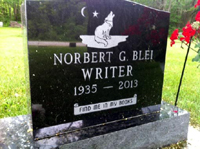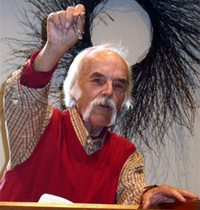


NOTES from the UNDERGROUND… No.141| April 29, 2008
VOICES FROM THE GRAVE:
HEMINGWAY, MAILER, VONNEGUT — AFTERLIVES
Hemingway’s Rage at Hollywood
April 26, 2008 — ERNEST Hemingway and Hollywood had a tempestuous relationship – but his utter hatred of the movies made from his famed novels is now just coming to light.
In “The Good Life According to Hemingway,” out next month, A.E. Hotchner, who traveled the globe with him, bares a series of never-before-published slaps Hemingway took at the film business.
When producer David O. Selznick crowed that his wife, Jennifer Jones, was starring in “A Farewell to Arms” and he’d pay Hemingway a $50,000 bonus from any profits, the novelist wrote back: “If by some miracle, your movie, which stars 41-year-old Mrs. Selznick portraying 24-year-old Catherine Barkley, does earn $50,000, you should have all $50,000 changed into nickels at your local bank and shove them up your [bleep] until they came out of your ears.”
Darryl F. Zanuck, the boss of 20th Century Fox, was trashed when he asked Hemingway to shorten the title of “The Short Happy Life of Francis Macomber,” which starred Gregory Peck. Hotchner quotes Hemingway, “I said, you want something short and exciting that will catch the eye of both sexes, right?” He then reeled off the first letters of Hollywood studio names that together spelled out the F-word. “That should fit all the marquees and you can’t beat it as a sex symbol.” Zanuck titled the film “The Macomber Affair.”
Of “The Sun Also Rises,” Hemingway raged: “Any picture in which Errol Flynn is the best actor is its own worst enemy.” As for “The Old Man and the Sea,” “I sat through all of that movie, numb. Spencer Tracy looked like a fat, very rich actor playing a fisherman.”
Hemingway, who committed suicide in 1961, snarked that in a love scene in “For Whom the Bell Tolls,”“didn’t take off his coat. That’s one hell of a way for a guy to make love, with his coat on – in a sleeping bag.” Gary Cooper (from N.Y. Post)

![]()
Mailer’s Longtime Mistress Sells Papers to Harvard
by Jay Lindsay, Associated Press Writer
BOSTON — An actress and writer who said she was Norman Mailer’s former longtime mistress has sold papers that include lengthy accounts of their sex life and hand-edited drafts of her writing to Harvard University, Mailer’s alma mater.
Carole Mallory saved seven boxes of material she said she collected during Mailer’s weekly visits between 1983 to 1992, while Mailer was married to his sixth and last wife, Norris Church.
“We’d have a writing lesson, we’d make love and then go to lunch in whatever order that would be, and I saved all the writing lessons,” said Mallory, 66 “I wanted him to teach me to be a writer. He was one of our greatest writers in America.”
Mallory, who appeared in movies including The Stepford Wives and modeled, won’t say how much she was paid for materials, and neither will Harvard. The school received the papers within the last month, said Beth Brainard, spokeswoman for the Harvard library She said the school pursued the papers because of Mailer’s importance as a writer, and because he’s a Harvard grad.
“It’s important to have Mailer represented in some way in the collection,” Brainard said. Mailer, who died last November at age 84, sold his own archives to the University of Texas for $2.5 million.
Mallory, who lives in Jeffersonville, Pa., said she waited to release his papers until after his death out of respect for Mailer and his family. She said she decided to sell the papers because she “knew they were valuable,” and also wanted them to be a part of history.
The collection includes photos, transcripts of interviews with Mailer, handwritten edits of Mallory’s work and scraps from writing lessons he gave. Mallory still recalls the principles Mailer emphasized, such as: keep the dialogue punchy; stay away from adverbs, don’t lecture the reader.
The collection also contains Mallory’s unpublished memoir, including a 20-page sex scene with Mailer, and a 50-page sex scene she said was based on her relationship with Mailer that she wrote for one of her books. She said Mailer had challenged her to write one that long.
“I don’t believe in shame,” Mallory said. “I believe in making love and love. I’m not going to go around and harbor secrets or shame about… loving someone. And I don’t think sex is something to be ashamed of.” (from USA Today)

![]()
And So It Went
Kurt Vonnegut, in a final collection, reflects on his distaste for war and embrace of individuality By Dan Wakefield | April 13, 2008 Armageddon in Retrospect: And Other New and Unpublished Writings on War and Peace By Kurt Vonnegut Putnam, 232 pp., illustrated, $24.95
“Writing was a spiritual exercise for my father, the only thing he really believed in. … His models were Jonah, Lincoln, Melville and Twain.” So begins the moving and illuminating introduction to this posthumous collection of Kurt Vonnegut’s work by his son Mark. A writer himself (“The Eden Express”) as well as a pediatrician in Greater Boston, Mark Vonnegut tells us his father “had a hard time letting himself be happy, but couldn’t quite hide the glee he got from writing well. … It wasn’t until the Iraq War and the end of his life that he became sincerely gloomy.”
Over lunch in New York three years ago Kurt told me he didn’t want to write anymore, that he felt his writing had always been based on “optimism, and pride in my country. I don’t have that now.” He had become, like the title of his next collection, “A Man Without A Country.”
One of Vonnegut’s last works was a talk he didn’t live to deliver last April in his hometown of Indianapolis to kick off what the city had declared “The Year of Vonnegut.” At the start of that speech, which is included in this book, he noted: “In only three years time, during World War Two, I went from Private to Corporal, a rank once held by Napoleon and Adolf Hitler.”
It was in the crucible of that war that much of the message of Vonnegut’s work was formed, and it can be seen here in microcosm in the three-page letter he wrote his family on May 29, 1945, after having been declared “missing in action” while a prisoner of war in a Dresden work camp. He told how many of his captured company died when they were herded into scalding showers after days of starvation, thirst, and exposure, “but I didn’t”; how the American and RAF firebombing of Dresden destroyed the city and killed 250,000 people, “but not me”; how the prisoners who were evacuated after General George Patton took Leipzig were strafed by Russian planes and many were killed, “but not me.”
One can hear in these cadences the future trademark that served as punctuation in Vonnegut’s work: “So it goes.” Vonnegut survived the Allied destruction of Dresden in an underground meat locker that became, in his famous fiction, Slaughterhouse Five. One piece in this book, “Wailing Shall Be in All Streets,”“ghoulish mission” recounts the nightmare of the saturation bombing of Dresden, and how in its aftermath Vonnegut and his fellow POWs were given the to search for bodies “and carry them to mass funeral pyres in the parks. . . . There was not enough labor to do it nicely, so a man with a flame-thrower was sent down instead and he cremated them where they lay.”
The short stories that compose the bulk of this book seem born of that experience – as does all of his work – in direct or thematic ways. In “Guns Before Butter” a trio of American POWs deal with their near-starvation rations by exchanging recipes and describing their favorite meals. “Food was the only thing on the P.W.’s pale level of existence that could have any effect on their spirits. Patton was a hundred miles away.”
In “The Commandant’s Desk” a Czechoslovakia woodworker and his daughter are subjected to the demands and insults of their passing conquerors – German, Russian, and American. The woodworker, a World War I veteran, comments that “when I hear of a division of war-lovers from an enlisted man, maybe I will believe it, provided the man is sober and has been shot at. If there are such divisions, perhaps they should be preserved between wars in dry ice.”
These stories are “mostly undated and all unpublished,” but references in some to the American-Russian standoffs of the Cold War suggest that many are early works, ones that simply didn’t fit the mold of the 1950s magazine fiction that was Vonnegut’s first market. They are no less accomplished or interesting for that, and will come as a final gift for fans.
In his later years, Vonnegut channeled much of his creative energy into painting and drawing, including posters with his thoughts and messages. One of these constitutes the last page of the book:
“Where do I get my ideas from? You might as well have asked that of Beethoven. He was goofing around in Germany like everybody else, and all of a sudden this stuff came gushing out of him.
“It was music.
“I was goofing around like everybody else in Indiana, and all of a sudden stuff came gushing out. It was disgust with civilization.”
It was disgust with the kind of civilization that reduced Dresden “to crushed stone and embers; disemboweled her with high explosives and cremated her with incendiaries,” the kind of civilization that in another era brought “shock and awe” to Baghdad.
The dark irony that lies beneath Vonnegut’s wry, satiric work is always in the service of the individual – Billy Pilgrim surviving the firebombing of Dresden, Eliot Rosewater giving his fortune away to help particular people with their problems – and against the system, the destructive side of civilization, represented here by the conqueror Robert The Horrible in Vonnegut’s neat medieval morality tale, “The Unicorn Trap.”
The story’s hero, Elmer the serf, resists the conqueror’s offer to make him a tax collector, part of the corrupt system, at the risk of his own neck. He explains his philosophy to his family: “The wreckers against the builders! There’s the whole story of life!”
Novelist Dan Wakefield is writer in residence at Florida International University. [from THE BOSTON GLOBE]




























































After the accident it became harder and harder to see how well he’d done for himself.
Everything became harder; barbed, dark, scary.
I used to make a mental note to leave the house at least once a day.
Then it became once a week.
I’d make up for this by helping any old or infirm people across the street. Not for them; to make me feel better, you see?
Once, I walked a very elderly lady across St. Vitus Street. When we got to the other side she said, “Can you manage the rest of the way on your own?”
I stopped after that.
Well, it all did.
The windscreen wipers wave back and forth. I wipe the tears away and see him disappear into the torrent. I wonder if he’s cold and remember my mother warning me about wearing damp clothes. She’d be staring into the mirror and flailing an arm around as though a wasp were attacking her; hairspray hissing out in all directions; plastic hair brush in the other hand, the pointed end jabbing her hair into place. It would make me hypothermic, she’d say.